The Importance of the Circadian Rhythm in Life
The circadian rhythm is a biological clock that is linked to the day/night cycles. It regulates much in our bodies, as well other animals, plants, fungi and cyanobacteria.
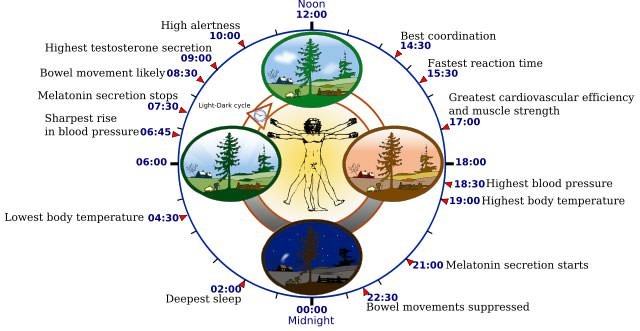
Source
Night-time Animals
Other animals even have extra biological clocks in addition to the circadian rhythm, such as regulations for feeding or reproduction being based on lunar or tidal cycles. A recent study showed how a nocturnal animal (Scyphax ornatus) only leave their sand burrows at night to feed before the tide comes in.
Despite appearing to follow a semilunar feeding cycle in the wild, the animals follows internal biological clocks when deprived of external stimuli like seeing the moon, hearing the waves, etc. But using artificial sounds changed the perceived length of the day and night/tidal cycles.
Nonhuman animals aren't the only ones affected by artificial manipulations of natural biological rhythms or clocks.
Sleep and Artificial Light
The circadian rhythm in humans has a similar night cycle that is activated by stimulus, or the lack thereof. Blue light from the sun suppresses the production of melatonin, keeping us alert and regulating the circadian rhythm. When the day ends and the sun goes down, that's the natural signal that it's getting time for bed, and the melatonin levels start to increase.
Another recent study confirms the issue with blue lights from digital devices and LEDs. Twenty-two study participants had an average 58% increase in nighttime melatonin levels when they wore short wavelength-blocking glasses that blocked the blue light. They fell asleep faster, slept better, and longer by 24 minutes each night.
To keep our natural "rhythm" going, we should pay attention to the artificial blue light being emitted from our technology. Lead of the study, Dr. Lisa Ostrin, recommends "limiting screen time, applying screen filters, wearing computer glasses that block blue light, or use anti-reflective lenses to offset the effects of artificial light at nighttime."
Blocking the light means we can still do work at night, but also get healthier sleep. 75% of Americans report poor or insufficient sleep has an impact on their daily activities.
Muscles, Fat and Insulin Regulation
Our dependence on the circadian rhythm doesn't stop there. Recent findings on fruit fly muscles show the energy is requested from fat storage tissues, and that this circuit is regulated by the circadian rhythm. This impacts fat storage, as during the day this circuit allows energy to be taken from lipids, meaning lipid management is important to make sure there is energy. While at night, we are less active, and we don't need to accumulate fat for energy purposes that might be required to move in the day. This can be a factor in obesity.
In this research, they also link fat and diabetes which many other people have done. The study explains how two genes are crucial for regulating fat storage and release, and they also regulate insulin levels and tell the body whether to store energy as fat or release it. Breaking the pathway can lead to disregulation of insulin and fat levels.
Our eating and sleeping behaviors also affects the signaling pathway. It probably matters when we eat, as our muscles signal when energy is needed and the circadian rhythm both affect the signaling pathways.
Calorie Restriction
Eating really does affect our body weight and circadian rhythm. A recent study on mice suggests that the time of day feeding* is done impacts weight more than calorie restriction. Mice on regular feeding/active cycles with calorie restriction do better at losing weight than other mice that are fed the same amount but at other rest time during the day.
Calories restriction seems to work best if they are consumed in the day while awake and active. Eating at the wrong time, like at night, will not lead to weight loss, despite calorie restriction.
Multiple Circadian Clocks
The overall circadian rhythm is based on multiple circadian clocks in our biology, not one central clock timing all of the bodies processes. Research published in a study this past May demonstrated how the central brain clock and peripheral clocks communicate with each other.
The fruit flies only hatch at the expected natural time if all the required clocks are in rhythm, as a functioning peripheral click alone does not sustain the early-morning biological hatching time. The hatching rhythm was slowed down to make it increase in time, from 24 hour to over 27 hours.
All our internal clocks needs to be running for the whole body to function in alignment to the natural rhythms we are accustomed to.
I pretty much wake up at 7-8am and go to bed at 11pm-ish. I look at my LCD monitor with LED backlight for hours each day, into the night until I go to bed. I don't see myself stopping to go on my computer when the sun sets :P
Have you noticed any cyclical requirements for your eating or sleeping behaviors?
Do you notice if the time you go to sleep or the time you eat affects your energy levels?
Do you avoid blue-light displays and do you find it helps your sleeping?
Thank you for your time and attention. Peace.
References:
https://en.wikipedia.org/wiki/Circadian_rhythm
https://phys.org/news/2017-06-evidence-animal-behaviour-interaction-tidal.html
https://www.nature.com/articles/s41598-017-03245-3
https://medicalxpress.com/news/2017-07-artificial-digital-devices-lessens-quality.html
http://onlinelibrary.wiley.com/doi/10.1111/opo.12385/abstract
https://phys.org/news/2017-07-muscles-energy.html
http://www.cell.com/current-biology/fulltext/S0960-9822(17)30705-4
https://www.sciencedaily.com/releases/2017/07/170718091542.htm
http://www.cell.com/cell-metabolism/fulltext/S1550-4131(17)30349-2
https://phys.org/news/2017-05-circadian-clocks.html
https://www.nature.com/articles/ncomms15563
If you appreciate and value the content, please consider:
Upvoting  , Sharing
, Sharing  or Reblogging
or Reblogging  below.
below.
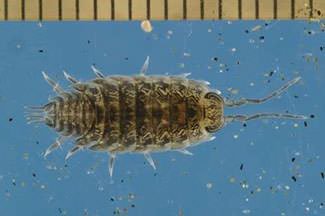

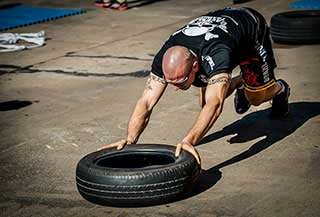
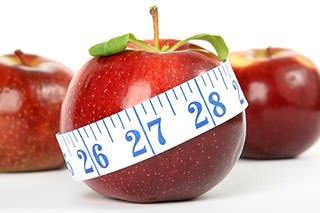
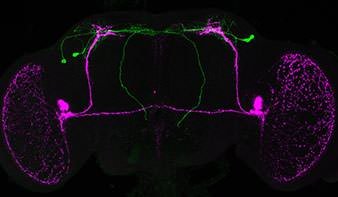

Unfortunately I have to work at night sometimes and I must admit that after I go to sleep at 6-7am and wake up at 2 pm i feel a bit dizzy for like 2h. What I do is force myself to do some simple physical activities like streatching it helps me in waking up. It is really important to stand up from your bed right after you wake up or at last dont spend there more than 5-10 minutes because it can only make you lazy for half of the day. Btw great tool for working before the computer at night is f.lux. It makes your display colours warmer so for eyes it's like you have been working in the daytime. Personally I use warm colours even in the daytime because they don't fatigue your sight that much :)
So you add more red to the display than blue to make it "warmer" than "cool""?
Exacly just try out f.lux and see for yourself. Display won't be harming your eyes even at full brightness. You can get flux here: https://justgetflux.com/
I just adjust the red or blue on my monitor :P
that's another way. Although f.lux can shift colours automaticly, depends on the time of the day :)
You can also wear blue/green light-blocking glasses; eg, https://www.patreon.com/posts/14530810
Stretching is really beneficial in the morning. Stretching and I'd say relaxed meditation; though for most people stretching as #1.
Me as well and I have this issue now that I can't seem to sleep properly.
I'm tempted to say the body can adapt to a different clock. For years now, I've been staying up late, so it's natural for me to go to bed at 2, even 3 a.m., but I don't get up early so, at least, I get enough sleep.
Yeah I'm not sure how much it does affect everyone, probably to different degrees for various things. You're still on a 24 h clock ;)
The postings that are interesting to me @krnel, by reading your article I so know a bit about the circadian rhythm in our lives and how important it is. Upvote and resteem.
Thanks for reading, learning, and for the support :)
You are welcome @krnel ;)
Appreciate this post, you obviously spent a lot of research time on it. You are helping people improve their lives. Very worthwhile effort!
Thanks for reading :D
The eating part during the day makes sense to me in a scientific point of view ... but then when I'm living in Spain, for some reason, the Spanish just enjoy eating their heavy dinners at 10PM or after ... which to me is crazy. Yet, I don't see many Spaniards as obese as lets say in the US. So that country is interesting for their tendency for very late eating habits.
Yeah, but they probably don't eat as much junk crap food either ;)
That's very much true. The Spaniards have a diet that consists of eating better kind of food. Like as much as I love bacon, it's honestly not super healthy to eat cooked bacon all the time. Whereas the Spaniards eat jamon serrano, and these other kind of sliced meat which are both delicious and much healthier than crispy bacon.
See my comment below. I think food and even eating times would have a major effect on these rhythms; I've studied nutrition for 6 years and experimented on myself and learned an extreme and diverse amount of key takeaways for what we do and put or don't put in our bodies effecting us in the short and medium-term
https://steemit.com/biology/@krnel/the-importance-of-the-circadian-rhythm-in-life#@mikeparker/re-krnel-the-importance-of-the-circadian-rhythm-in-life-20170730t223524200z
" way too much calories, sodium, added sugar and processed food in general."
That I totally agree. Which is part of reason why sleep schedules in America are generally quite off (even I'm guilty of it at times haha).
thanks for response. Yes, American culture is causing many of our own biological problems
Thanks for this useful information. I feel very dizzy when I don't have enough sleep. Sleeping is very important.
How much is not enough sleep to feel dizzy?
seems im night animal not human :D i wake up at 2 pm and go to sleep at morning )) Blue light display dont help me sleep, but total darkness and no sounds help.
Blue light doesn't help anyone sleep, that's the point lol.
I give it a 7 because you can dance to it!
I'm confused, what gets a 7? Dance what? Huh?
Circadian Rhythms... they're great for dancing!
I'm not doing a very good job of following your advice here despite the fact that I know it's important... I'll try to change my ways... after the summer :P
Getting yelled at is strangely motivational. Much more effective than the clam and intellectual approach :P
Now if I'm a leader should I yell at my subordinates? Kind of a rhetorical or sarcastic question but at the same time it could be quite effective.
Too often I'm soft-spoken and need to rise up to the occasion of directing people to the proper path since I have great ideas and need to build teams around business structures I want to accomplish.
lol Depends on your acting chops :P It's about your comedic timing ;)
On a bit of more serious note, leadership is hard. My guess would be that directing people to a path is actually inferior as a motivational tool to convincing people why this is the right path. The best thing to build a team around is a shared vision rather than a dictated vision. But that's not easy to accomplish in the real world.
The convincing takes time and more varied methods I'd say than simply having people know you are the leader and project those qualities and have them obey. I guess I'm talking about a team of non-equals here, that's why I used the word subordinates.
Of course, convincing is not about formal structure and sometimes the fact that you are a formal leader giving out orders actually makes you less convincing because of the disconnect.
If you want to lead by conviction, talking about non-equality doesn't really make any sense to me as the fact that somebody is a subordinate to somebody else in the formal chain of command has no bearing on what either of them would be convinced of.
Of course, there are all kinds of leadership styles and the idea that everybody would always be convinced of everything that is asked of them is not realistic. Still, I would say that when team members are doing things with conviction, the efficiency of the team could increase significantly and management and leadership would require a bit less effort and time.
I don't either lol.
start with baby steps :) nothing too overwhelming that you can't handle. People usually change more permanently into new habits slowly
Excellent information. I practice both intermittent fasting and ketosis but have not not considered this aspect of a healthy lifestyle. I will dig deeper into this for sure. Keep the articles coming.
Thanks ;)